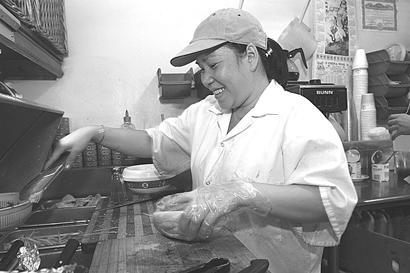By Lesley Sussman
Billy Dang took a break from behind the busy food counter at Nicky’s Vietnamese Sandwiches, at 150 E. Second St., to talk about Vietnam. He recalled memories of being a child and one of the boat people who were forced to leave that country and a family that he says were once “as wealthy as the Trumps.”
The soft-spoken, on-the-thin-side 35-year-old college dropout with an easy smile was driving a yellow cab in New York City before he and his sister, Teresa, decided to open the two-table, mostly take-out East Village hole-in-the wall two years ago.
“I’ve gone from having servants to being one working here,” he quipped.
Dang returns to a time when he was a happy 7-year-old, whose family was one of the wealthiest in Hanoi.
“We had a large house, several maids and a couple of cars,” he said. “And it was all thanks to my entrepreneurial grandfather, who owned various restaurants, theaters and hotels, among other real estate holdings.”
Even the Vietnam War didn’t affect the family’s wealth, he says. The closest to danger Dang and his family came is one day when they were on bicycles and bullets began flying over their heads.
“My father never gets tired of telling the story of that day,” Dang said. “My mother and father were on bicycles carrying me and my little sister and all of sudden all hell broke loose. There were dead bodies everywhere, but they managed to escape.”
Dang says that his father helped to keep the family coffers filled with his successful import-export businesses, while his mother earned good money as a hairstylist who operated an exclusive beauty salon in Hanoi.
“The salon catered to celebrities as well as some of the most powerful people in government — including a general’s daughter,” he said.
That lifestyle of the rich and famous went through a radical change in the mid-1970s, however, because of rising tensions between Vietnam and China.
“I’m not sure what it was all about, but my mom and dad were part Chinese and the government forced anyone who was Chinese or part Chinese to leave the country,” Dang explained.
“I was somewhere between 7 and 8 years old and all I remember is that one day my grandparents, some uncles and their wives and kids, my parents, me, my second sister and my third brother all were put into a boat and there we were out in the sea. I don’t remember being scared because I didn’t know what was going on.
“What I do remember,” he continued, “is that we had to leave in a big hurry and that we all carried food and water. The boat’s destination was China, but my parents later told me that no one in the boat had any real idea what direction that was. My mother said there were 120 people on that boat, and I still can remember that it was very crowded.”
Dang has some other fleeting memories of that sea voyage — both good and bad.
“It was pretty late at night,” he recalled, “and there was a hurricane and a thunderstorm. The boat shook and I heard people screaming that we had hit a rock or something. But we didn’t capsize. It was a small impact. Still, I remember being very scared.”
On the lighter side, Dang laughingly recollected a day when his father and a few of his friends jumped off the boat and decided to go for a swim.
“All of a sudden, the wind picked up and the boat started moving. They had to swim quite fast to catch up with us.”
Dang has one other clear memory of his time on the boat.
“Some big ship came by and they were going to attach our boat to their hull, but they wanted money or jewelry or they wouldn’t do us a favor. There was a woman sitting next to me who didn’t want to give up her jewelry, so she took her diamond and swallowed it. I’ll never forget that.”
Dang says the boat eventually made it to China, where for several months they lived in an immigrant camp. His grandmother sold baked goods and his mother did some hairstylist work to earn a little money for the family. From there, they were sent to Hong Kong, and sometime between 1979 and 1980 managed to get passage to the United States, where the Dangs settled in Chinatown.
“We all started to work hard here at anything we could to put food on the table,” he said. “It was a different lifestyle for all of us. We were no longer like the Trumps.” He laughed. “Today, we’re the opposite of the Trumps.”
With one Vietnamese sandwich shop — the first authentic Vietnamese restaurant outside of Chinatown — now doing well in its E. Second St. digs in the East Village, Dang and his sister are preparing to open a second location in Brooklyn later this month.
The new location will offer the same scrumptious and inexpensive Vietnamese sandwiches, such as the classic banh mi sandwich. Served on a toasted baguette, this $3.95 bargain is a pleasing mix of savory meat (pâté, ham and pork) and sweet pickled veggies (carrots and cucumber), plus a touch of cilantro and moderate dollop of mayo. For the more vegetarian minded, there’s the tasty Vietnamese sardine or portobello mushroom sandwiches also served on toasted baguettes.
“I’d like to be a millionaire in this country,” Dang admits. “But not because I’d like to be wealthy for myself. I want to help my family, because they’re the most important thing in my life. I’d like to recreate the good life they once had in Vietnam. I also want to help others. So right now I’m busting my bun to do so.”






































